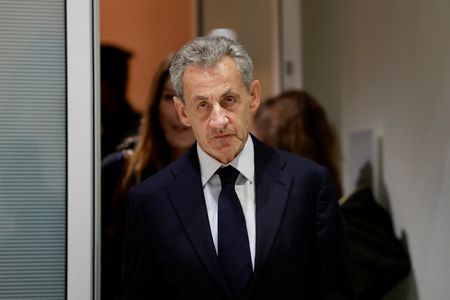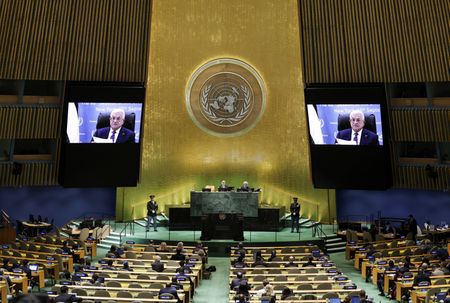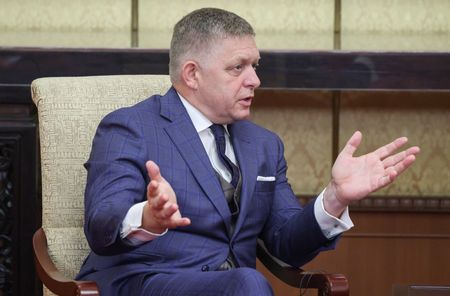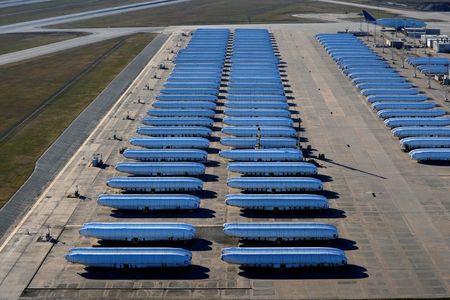By Charlie Devereux
(Reuters) -Denmark said on Thursday it was weighing whether to invoke Article 4 of NATO’s founding treaty after drone incursions briefly shut two of its airports and affected military installations in its western Jutland region overnight.
Danish Defence Minister Troels Lund Poulsen described the incursions as “hybrid attacks” designed to spread fear but said he did not know who was behind them.
Earlier, Prime Minister Mette Frederiksen linked similar drone incursions that briefly shut Copenhagen airport overnight into Tuesday to a series of suspected Russian drone incursions and other disruptions across Europe. Moscow denied involvement.
WHAT HAPPENED?
Billund airport, Denmark’s second biggest, was closed for an hour, and Aalborg airport, used for commercial and military flights, was closed for three hours due to drone incursions late on Wednesday, Danish police said. Both had reopened on Thursday.
Drones were also observed overnight near airports in Esbjerg and Sonderborg, as well as Skrydstrup airbase, home to some of Denmark’s F-16 and F-35 fighter jets, and over a military facility in Holstebro, police told Reuters.
All affected locations are on the Jutland peninsula in western Denmark.
Danish authorities said they decided not to take down any of the drones in their airspace for safety reasons, despite the disruption caused to air traffic.
WHAT IS ARTICLE 4?
Article 4 states that members of the North Atlantic Treaty Organization will consult together whenever, in the opinion of any of them, the territory, political independence or security of any of them is threatened.
Under Article 4, discussions at the North Atlantic Council – NATO’s principal political decision-making body – could potentially lead to some form of joint decision or action.
The Danish government is holding discussions internally and with NATO on whether to invoke Article 4, Defence Minister Poulsen said.
If it does so, it would be the second time this month. Polish Prime Minister Donald Tusk invoked Article 4 on September 10 after Poland shot down drones in its airspace following what he called a “large-scale provocation” by Russia.
Russia’s defence ministry said its drones had carried out an attack on military facilities in western Ukraine but that it had not planned to hit any targets in Poland.
Several European officials described that incursion as intentional and a sign of Russian escalation.
Article 4 was also invoked in February 2022 when Bulgaria, the Czech Republic, Estonia, Latvia, Lithuania, Poland, Romania and Slovakia sought consultations following Russia’s invasion of Ukraine.
WHAT IS ARTICLE 5?
If Russia were determined to have attacked the territory of a member state, the focus would then shift to Article 5, the cornerstone of NATO’s founding treaty.
The alliance was created in 1949 with the U.S. military as its powerful mainstay essentially to counter the Soviet Union and its eastern bloc satellites during the Cold War.
The charter stipulates that “the Parties agree that an armed attack against one or more of them in Europe or North America shall be considered an attack against them all.”
“They agree that, if such an armed attack occurs, each of them, in exercise of the right of individual or collective self-defense recognized by Article 51 of the Charter of the United Nations, will assist the Party or Parties so attacked by taking forthwith, individually and in concert with the other Parties, such action as it deems necessary, including the use of armed force, to restore and maintain the security of the North Atlantic area,” it says.
HOW COULD THE UKRAINE WAR TRIGGER ARTICLE 5?
Since Ukraine is not part of NATO, Russia’s full-scale invasion in February 2022 did not trigger Article 5, though the United States and other member states rushed to provide military and diplomatic assistance to Kyiv.
However, experts have long warned of the potential for a spillover to neighbouring countries on NATO’s eastern flank that could force the alliance to respond militarily.
Such action by Russia, either intentional or accidental, has raised the risk of widening the war by drawing other countries directly into the conflict.
IS INVOKING ARTICLE 5 AUTOMATIC?
No. Following an attack on a member state, the others come together to determine whether they agree to regard it as an Article 5 situation.
There is no time limit on how long such consultations could take, and experts say the language is flexible enough to allow each member to decide how far to go in responding to armed aggression against another.
Article 5 has been activated once before – on behalf of the United States, in response to the September 11, 2001, hijacked-plane attacks on New York and Washington.
(Reporting by Matt Spetalnick and Charlie Devereux, Editing by Timothy Heritage, Gareth Jones, Peter Graff)










